01-10-2009 | ADis Drug Profile
Everolimus
In Advanced Renal Cell Carcinoma
Published in: Drugs | Issue 15/2009
Login to get accessAbstract
-
▲ Everolimus is an orally administered, targeted therapy indicated for the treatment of advanced renal cell carcinoma. It inhibits the mammalian target of rapamycin, an integral component of multiple pathways involved in cell growth and proliferation.
-
▲ Median progression-free survival was significantly longer with everolimus 10 mg once daily than with placebo in both second interim (4.0 vs 1.9 months) and updated (4.9 vs 1.9 months) analyses of a randomized, double-blind, placebo-controlled, multicentre, phase III trial in patients with metastatic renal cell carcinoma that had progressed while receiving sunitinib and/or sorafenib treatment.
-
▲ At the second interim analysis, median overall survival was 8.8 months for placebo recipients; at this analysis, overall survival had not yet been reached for everolimus recipients.
-
▲ With regard to objective response at the second interim analysis, 64% of everolimus and 32% of placebo recipients had either a partial response (1% and 0%) or stable disease (63% and 32%).
-
▲ The tolerability profile of everolimus was largely manageable in the phase III trial, with most treatment-related adverse events being of grade 1 or 2 severity.





